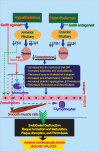Cardiovascular Toxicities of Androgen Deprivation Therapy
- PMID: 33866442
- PMCID: PMC8053026
- DOI: 10.1007/s11864-021-00846-z
Cardiovascular Toxicities of Androgen Deprivation Therapy
Abstract
Prostate cancer is the second leading cause of cancer death in men, and cardiovascular disease is the number one cause of death in patients with prostate cancer. Androgen deprivation therapy, the cornerstone of prostate cancer treatment, has been associated with adverse cardiovascular events. Emerging data supports decreased cardiovascular risk of gonadotropin releasing hormone (GnRH) antagonists compared to agonists. Ongoing clinical trials are assessing the relative safety of different modalities of androgen deprivation therapy. Racial disparities in cardiovascular outcomes in prostate cancer patients are starting to be explored. An intriguing inquiry connects androgen deprivation therapy with reduced risk of COVID-19 infection susceptibility and severity. Recognition of the cardiotoxicity of androgen deprivation therapy and aggressive risk factor modification are crucial for optimal patient care.
Keywords: Cardiotoxicity; Cardiovascular disease; Hormones; Mortality; Prevention; Prostate cancer; Side effects.
Conflict of interest statement
Azariyas A. Challa declares that he has no conflict of interest. Adam Christopher Calaway declares that he has no conflict of interest. Jennifer Cullen declares that she has no conflict of interest. Jorge Garcia declares that he has no conflict of interest. Nihar Desai declares that he has no conflict of interest. Neal L. Weintraub declares that he has no conflict of interest. Anita Deswal declares that she has no conflict of interest. Shelby Kutty declares that he has no conflict of interest. Ajay Vallakati declares that he has no conflict of interest. Daniel Addison declares that he has no conflict of interest. Ragavendra Baliga declares that he has no conflict of interest. Courtney M. Campbell declares that she has no conflict of interest. Avirup Guha declares that he has no conflict of interest.
Figures

References
References and Recommended Reading
Papers of particular interest, published recently, have been highlighted as: • Of importance •• Of major importance
-
- American Cancer Society. Key statistics in prostate cancer. 2019 [cited 2019 17 May]; Available from: https://www.cancer.org/cancer/prostate-cancer/about/key-statistics.html.....
Publication types
MeSH terms
Substances
Grants and funding
LinkOut - more resources
Full Text Sources
Other Literature Sources
Medical

